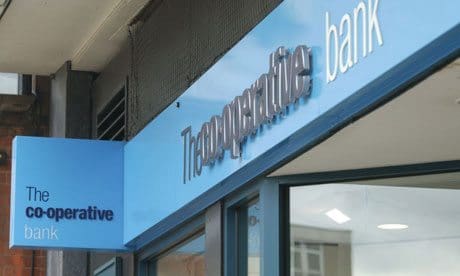The Financial Conduct Authority (FCA) and Prudential Regulation Authority concluded that levying significant financial penalties would undermine the bank’s recovering prospects, as reported by Sky News City Editor Mark Kleinman yesterday.
Evidence of weak oversight was uncovered during the 18-month enforcement probe, and this normally would have merited a substantial fine being imposed.
Dennis Holt, chairman of the Co-op Bank, stressed that the censures were not a reflection of how the bank is run today.
He added: “On behalf of the bank, I would like to apologise again to customers for these past failings and reassure them that the bank is a significantly stronger organisation today under the leadership of the current senior management team.”
On Tuesday morning, regulators confirmed they are continuing with enforcement investigations against key figures involved in the Co-op Bank’s collapse, including Paul Flowers, its former chairman.
Nicknamed “the Crystal Methodist” by a tabloid newspaper in reference to drug-taking allegations, Mr Flowers’ ignorance about the size of the lender’s balance sheet while giving evidence to MPs became a symbol of the amateurish management of what was then the UK’s seventh-largest bank.
Regulators’ inquiries have focused on the period dating back to 2008, when the Co-op’s banking arm and Britannia Building Society combined to form a “super-mutual” aimed at challenging the UK’s dominant high street lenders.
However, the toxic nature of many of the loans on the combined balance sheet remained undiagnosed, even as the Co-op Bank attempted to pursue a takeover of 632 Lloyds Banking Group branches.
The emergence of a £1.5bn black hole on its balance sheet led to the failure of its bid for the Lloyds branches – which later became TSB Banking Group – and an emergency bailout by bondholders which reduced the Co-op Group’s stake to just 20 per cent.
Mr Flowers’ personal troubles also became an emblem of the dysfunctional governance of the UK’s biggest mutual, which has since faced a complete overhaul of its governance, while shedding thousands of jobs under new leadership.
In June, the Co-op Bank updated debtholders on its talks with regulators, saying: “The PRA is undertaking an enforcement investigation in relation to the Bank and as part of that investigation will consider the role of former senior managers; (and) the FCA is undertaking enforcement investigations covering decisions, events and processes at the Bank over the period from consideration of the merger with Britannia Building Society in mid-2008 to the end of 2013.”
Those probes had been launched in January 2014, it said, with the Bank’s board having been informed that the authorities were “minded to make findings against the Bank covering certain decisions, events and processes over the period from mid-2008 to end 2013”.
Niall Booker, the Co-op Bank’s chief executive, said in June that it had highlighted “the risks of any adverse findings and penalties relating to these past events…on multiple occasions”.
Last December, the Co-op Bank achieved the ignominious status of being the only major UK lender to fail the Bank of England’s stress tests, despite having raised capital from investors on several occasions.
As a consequence of its PRA stress test failure, the Co-op Bank postponed a vote on incentive awards for Mr Booker and senior colleagues.
Mr Booker has committed to remaining in place until the end of next year, although there has been persistent speculation that the Co-op Bank will ultimately be folded into another UK high street lender, such as TSB or Clydesdale.
The Treasury has also said that it will conduct an inquiry into the Co-op Bank debacle, although this will not get underway until after the PRA and FCA have concluded their investigations.


